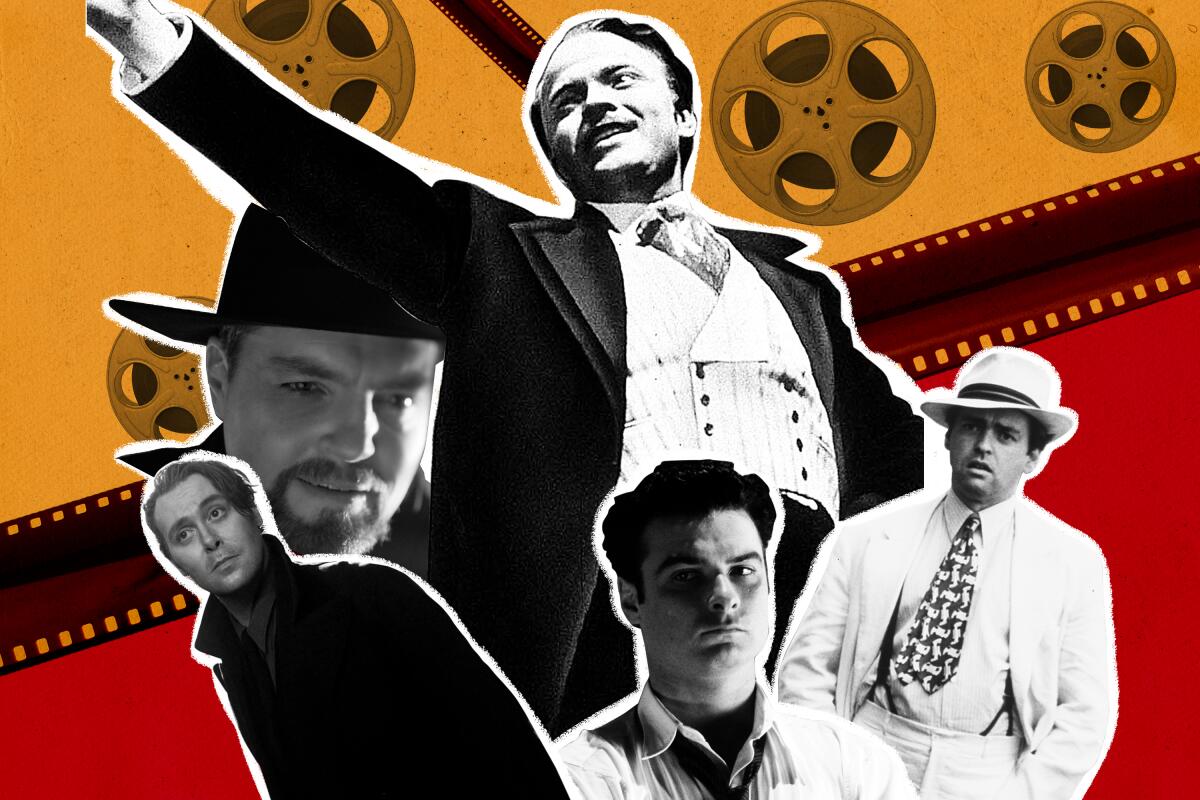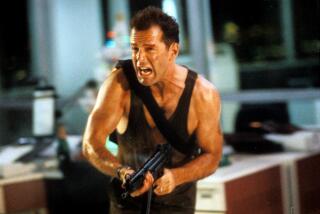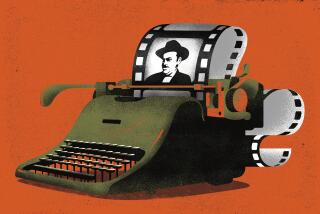‘Mank’ brings just the latest in a long line of Orson Welles depictions

- Share via
“I don’t want any description of me to be accurate,” Orson Welles told critic Kenneth Tynan in 1967. “I want it to be flattering.” It’s a typical Welles bon mot, blustery and witty and egocentric. And it suggests he wouldn’t care for the majority of Welles depictions that have graced the screen over the years, very few of which flatter.
He’s been portrayed as a drunk (“Cradle Will Rock”) and a bully (“Me and Orson Welles”), a morose cynic (“RKO 281”) and a gluttonous has-been (in several often very funny TV spoofs). In “Mank,” David Fincher’s December release about the writing of and subsequent credit jockeying over “Citizen Kane,” Welles is pushed to the periphery as “Kane’s” cowriter, Herman J. Mankiewicz (played by Gary Oldman), takes center stage, reigniting a longstanding debate over who actually wrote “Kane.” (Welles and Mankiewicz ended up sharing both credit and the original screenplay Oscar, the only one “Kane“ won).
Derided with jealousy as an aristocratic Hollywood outsider at the start of his career, then mocked as a sellout who couldn’t finish countless passion projects, Welles, who died in 1985, has seldom caught a posthumous break from the industry that shunned him.
Welles certainly shares some of the qualities that comprise these movie and TV caricatures. He did boss people around, particularly crew members. He could be a monomaniac. He did grow morbidly obese, and near the end of his life, he was best known as a TV pitchman. This is all well documented.
But some who knew him, worked with him and studied him just don’t see the real Welles in the many depictions.
“What these films miss about him is that he was a lot of fun to work with,” says Joseph McBride, who has a unique, multifaceted perspective of Welles. McBride has written three books about him and also worked with him, playing a version of himself as an earnest young film critic in Welles’ lost film, “The Other Side of the Wind,” which was finally finished and shown in 2018.
“He had a great sense of humor, and he was hysterically funny,” says McBride. “When you worked with him on a film, he was telling jokes all day long and telling wonderful stories and even singing songs. He was charming and delightful.”
Tom Burke, who plays the young, “Citizen Kane”-era Welles in “Mank,” returns time and again to the same descriptor: “puckish.” “You see that in a lot of his performances, especially ‘Citizen Kane,’ ” Burke says. “It’s there in the eyes and the mouth. I got the feeling that was very much a part of him, certainly the younger him. He was always this mercurial raconteur.” And he mythologized himself, usually in interviews, every bit as much as those who have played him. One of his better late films is a study in forgery and authenticity called “F for Fake.” As he once told Tynan, “I drag my myth around with me.”
Actors playing Welles face the task of capturing (or innately possessing) both physical attributes and intangible character traits. Inevitably, the first test to be passed is Welles’ voice.
Welles, a creature of the radio and theater before he came to Hollywood, spoke in a kind of stentorian purr that could get very loud when he wanted something. Burke nails this quality, which is fortunate, given that his Welles is largely depicted as a disembodied voice on the other end of a phone call.
“My first impression of Welles was that his voice was kind of booming, but it really wasn’t quite a boom,” the English actor says. “It was much more a certain tension that people of that period had, almost English sounding, especially stage actors of that period.”
The Welles voice is so important that it sometimes necessitates an industry ringer. There’s a brief, affectionate scene in Tim Burton’s “Ed Wood” that finds the famously inept filmmaker (Johnny Depp) commiserating with Welles over the ways of Hollywood bean counters. Vincent D’Onofrio plays Welles, and he looks the part; he even played Welles in a later short film, “Five Minutes, Mr. Welles.” In “Ed Wood,” however, D’Onofrio’s voice is dubbed by the sonorous voice actor Maurice LaMarche, who also did Welles duty on the ‘90s animated series “Pinky and the Brain.” (More on that shortly). In short, if you need a Welles voice, you call LaMarche.
If Burke gets high marks (in such limited screen time), other portrayals seem to get every part of the package wrong. In 1999’s “Cradle Will Rock,” about the staging of the 1937 agitprop musical theater production that Welles directed, director Tim Robbins and actor Angus Macfadyen conjure Welles as a frivolous bantam-weight drunk nominally in charge of a production that seemingly directs itself. Macfadyen looks and sounds nothing like Welles, but for those who study Welles, that’s the least of the portrayal’s issues.
“There was a lot of stuff about Welles that was wrong,” says film historian James Naremore, author of “The Magic World of Orson Welles.” “He was certainly a womanizer, and he certainly ate too much. But he was not an alcoholic, and he had more to do with that play than that film gives him credit for.”
Another film about Welles’ theater career gets closer to the mark. In 2008’s “Me and Orson Welles,” Christian McKay is physically imposing, professionally demanding and charming as all get-out. The story, built around the 22-year-old Welles’ 1937 modern dress, fascist-themed Mercury Theatre production of “Caesar,” finds Welles coaxing and manipulating a young actor (Zac Efron) through opening night.
This Welles isn’t a particularly nice guy; his ego leads him to fire the kid with no legitimate cause after bullying him all over the place. But he is magnetic and a lot of fun in a domineering way. And he’s very much in charge, even if some of the crew, including Welles’ producer and Mercury Theatre partner John Houseman, seem to wish he weren’t. (Houseman, played here by Eddie Marsan, in “Cradle” by Cary Elwes and in “Mank” by Sam Troughton, is generally depicted as the grown-up in the room with Welles, which is pretty accurate as these things go).
The focus of these films, to borrow the title of Patrick McGilligan’s biography, is “Young Orson.” But there’s also a deep rabbit hole of older Orson depictions out there, most delivered in playful, potshot fashion. Some of these are wickedly funny.
By the 1970s, as Welles tried usually in vain to finance and complete his own independent films, he had become a caricature of himself: a massive, bearded man, a staple of celebrity roasts, talk shows and commercials for Paul Masson wine. Go to YouTube and you’ll find audio outtakes from 1970 of an irascible Welles (the real one) pitching frozen peas and fish sticks, audio that later inspired a choice episode of “Pinky and the Brain” (featuring the voice of LaMarche as the Wellesian Brain).
The joke is pretty simple: The once-mighty Welles, Charles Foster Kane himself, has been reduced to snarling orders at voice-over directors. In a similar vein, a heavily made-up John Candy appeared as Welles on Billy Crystal’s short-lived variety show in 1982 and started barking orders, in character, at the show’s director (“I’m on my mark! Move your camera!”).
It’s not flattering. If accurate, it’s also terribly reductive. Alas, this is what happens when titanic talents and personalities hit a decline and live long enough to invite caricature, when a wunderkind eats too much later in life and loses his shine. Actors playing Welles, the young version or the old, have found it all too easy to take a big personality and go even bigger, or meaner, or drunker. And Welles had the misfortune of never being boring.
On the other hand, 35 years after his death, we’re still talking about him. Surely, that would draw from him a big, basso profundo chuckle.
More to Read
Sign up for The Envelope
Get exclusive awards season news, in-depth interviews and columnist Glenn Whipp’s must-read analysis straight to your inbox.
You may occasionally receive promotional content from the Los Angeles Times.










